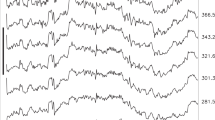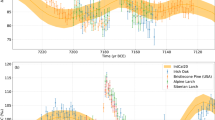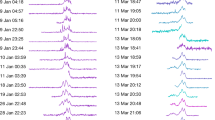Abstract
HOURLY records of the intensity of cosmic rays have been made during the past year. The apparatus used consisted of a battery of Geiger counters registering about 25,000 threefold coincidences each hour. The circuit used gave a negligibly small number of casual coincidences. No absorbing screens were used, but preliminary experiments with lead showed that the thickness of the counter walls was sufficient to cut out all radioactive rays and the very soft cosmic rays. To count such a rapid rate of coincidences without loss, a Wynn-Williams' scale-of-two counter1was used. For this circuit the resolving time is so reduced that, at the counting rate of 400 per minute, the number of particles which is missed is not more than one per thousand. The number of pulses recorded by the telephone counter is photographed automatically every hour.
This is a preview of subscription content, access via your institution
Access options
Subscribe to this journal
Receive 51 print issues and online access
$199.00 per year
only $3.90 per issue
Buy this article
- Purchase on Springer Link
- Instant access to full article PDF
Prices may be subject to local taxes which are calculated during checkout
Similar content being viewed by others
References
Wynn-Williams, C. E., Rep. Prog. Phys., 3, 239 (1937).
Author information
Authors and Affiliations
Rights and permissions
About this article
Cite this article
DUPERIER, A. Cosmic Rays and Magnetic Storms. Nature 149, 579–580 (1942). https://doi.org/10.1038/149579a0
Issue Date:
DOI: https://doi.org/10.1038/149579a0
This article is cited by
-
Cosmic Rays and the Great Sunspot Group of January 29–February 12, 1946
Nature (1946)
-
Absorption in the Atmosphere and Decay of Cosmic Rays
Nature (1944)
-
An Exceptional Increase of Cosmic Rays?
Nature (1943)
Comments
By submitting a comment you agree to abide by our Terms and Community Guidelines. If you find something abusive or that does not comply with our terms or guidelines please flag it as inappropriate.



